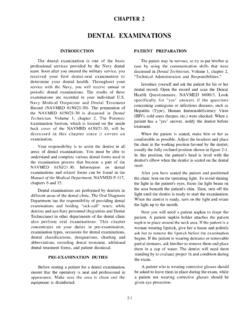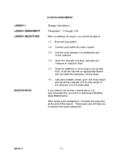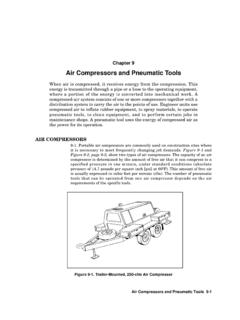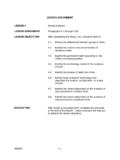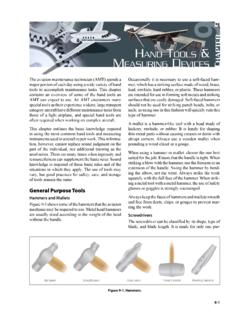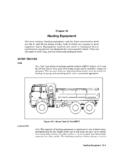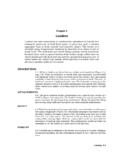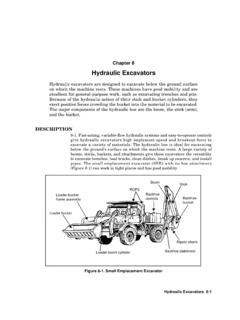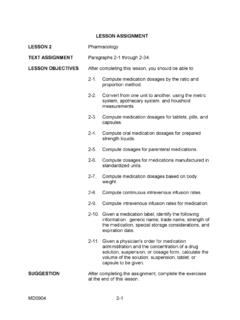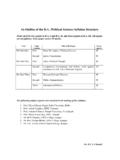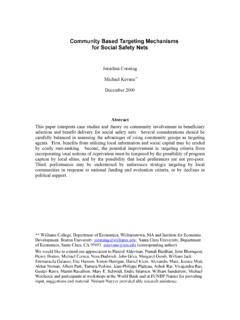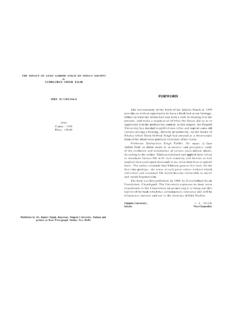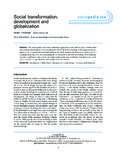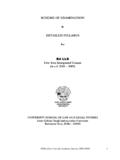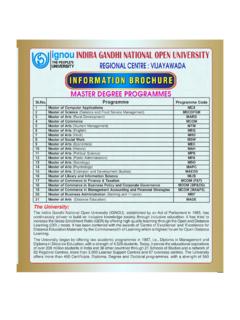Transcription of Political science - sweethaven02.com
1 Political science1 Political sciencePolitical science is a social science concerned with the theory and practice of politics and the analysis of politicalsystems and Political behavior. Political scientists "see themselves engaged in revealing the relationships underlyingpolitical events and conditions. And from these revelations they attempt to construct general principles about the waythe world of politics work."[1] Political science intersects with other fields; including public policy, national politics,economics, international relations, comparative politics, psychology, sociology, history, law, and Political science is commonly divided into three distinct sub-disciplines which together constitute the field: PoliticalPhilosophy, Comparative Politics and International Relations. Political Philosophy is the reasoning for an absolutenormative government, laws and similar questions and their distinctive characteristics. Comparative Politics is thescience of comparison and teaching of different types of constitutions, Political actors, legislature and associatedfields, all of them from an intrastate perspective.
2 International Relations deals with the interaction betweennationstates as well as intergovernmental and transnational science is methodologically diverse and appropriates many methods originating in social include positivism, interpretivism, rational choice theory, behavioral, structuralism, post-structuralism,realism, institutionalism, and pluralism. Political science , as one of the social sciences , uses methods and techniquesthat relate to the kinds of inquiries sought: primary sources such as historical documents and official records,secondary sources such as scholarly journal articles, survey research, statistical analysis, case studies, and modelbuilding."As a discipline" Political science , possibly like the social sciences as a whole, "lives on the fault line between the'two cultures' in the academy, the sciences and the humanities."[2] Thus, in some American colleges where there is noseparate School or College of Arts and sciences per se, Political science may be a separate department housed as partof a division or school of Humanities or Liberal Arts.
3 [3] Whereas classical Political philosophy is primarily definedby a concern for Hellenic and Enlightenment thought, Political scientists are broadly marked by a greater concern for"modernity" and the contemporary nation state, and as such share a greater deal of terminology with sociologists( structure and agency).OverviewPolitical scientists study matters concerning the allocation and transfer of power in decision making, the roles andsystems of governance including governments and international organizations, Political behavior and public measure the success of governance and specific policies by examining many factors, including stability,justice, material wealth, and peace. Some Political scientists seek to advance positive (attempt to describe how thingsare, as opposed to how they should be) theses by analyzing politics. Others advance normative theses, by makingspecific policy scientists provide the frameworks from which journalists, special interest groups, politicians, and theelectorate analyze issues.
4 According to Chaturvedy, ".. Political scientists may serve as advisers to specificpoliticians, or even run for office as politicians themselves. Political scientists can be found working in governments,in Political parties or as civil servants. They may be involved with non-governmental organizations (NGOs) orpolitical movements. In a variety of capacities, people educated and trained in Political science can add value andexpertise to corporations.[4] Private enterprises such as think tanks, research institutes, polling and public relationsfirms often employ Political scientists."[5] In the United States, Political scientists known as "Americanists" look at avariety of data including elections, public opinion and public policy such as social Security reform,.. foreignpolicy, US Congressional committees, and the US Supreme Court to name only a few United States colleges and universities offer programs in Political science .
5 Or and or programs are common at larger universities. The term Political science is more popular in North America thanPolitical science2elsewhere; other institutions, especially those outside the United States, see Political science as part of a broaderdiscipline of Political studies, politics, or government. While Political science implies use of the scientific method, Political studies implies a broader approach, although the naming of degree courses does not necessarily reflect theircontent.[6] Separate degree granting programs in international relations and public policy are not uncommon at boththe undergraduate and graduate levels. Master's level programs in Political science are common while politicalscientists engage in public administration.[7]The national honour society for college and university students of government and politics in the United States is PiSigma Machiavelli, one of many influentialpolitical theoristsPolitical science is a relatively late arrival in terms of social , the discipline has a clear set of antecedents such as moralphilosophy, Political philosophy, Political economy, Political theology,history, and other fields concerned with normative determinations ofwhat ought to be and with deducing the characteristics and functions ofthe ideal state.
6 In each historic period and in almost every geographicarea, we can find someone studying politics and increasing antecedents of Western politics can trace their roots back to Plato(427 347 BC) and Aristotle [(The Father of Political science )](384 322 BC), particularly in the works of Homer, Hesiod,Thucydides, Xenophon, and Euripides. Later, Plato analyzed politicalsystems, abstracted their analysis from more literary- and history-oriented studies and applied an approach we would understand ascloser to philosophy. Similarly, Aristotle built upon Plato's analysis toinclude historical empirical evidence in his analysis. Plato wrote TheRepublic and Aristotle wrote the rise and fall of the Roman EmpireDuring the height of the Roman Empire, famous historians such as Polybius, Livy and Plutarch documented the riseof the Roman Republic, and the organization and histories of other nations, while statesmen like Julius Caesar,Cicero and others provided us with examples of the politics of the republic and Rome's empire and wars.
7 The studyof politics during this age was oriented toward understanding history, understanding methods of governing, anddescribing the operation of governments. Nearly a thousand years elapsed, from the foundation of the city of Romein 753 BC to the fall of the Roman Empire or the beginning of the Middle Ages. In the interim, there is a manifesttranslation of Hellenic culture into the Roman sphere. The Greek gods become Romans and Greek philosophy in oneway or another turns into Roman law Stoicism. The Stoic was committed to preserving proper hierarchical rolesand duties in the state so that the state as a whole would remain stable. Among the best known Roman Stoics werephilosopher Seneca and the emperor Marcus Aurelius. Seneca, a wealthy Roman patrician, is often criticized bysome modern commentators for failing to adequately live by his own precepts. The Meditations of Marcus Aurelius,on the other hand, can be best thought of as the philosophical reflections of an emperor divided between hisphilosophical aspirations and the duty he felt to defend the Roman Empire from its external enemies through hisvarious military campaigns.
8 According to Polybius, Roman institutions were the backbone of the empire but Romanlaw is the medulla.[8] Political science3 The Middle AgesWith the fall of the Western Roman Empire, there arose a more diffuse arena for Political studies. The rise ofmonotheism and, particularly for the Western tradition, Christianity, brought to light a new space for politics andpolitical action. Works such as Augustine of Hippo's The City of God synthesized current philosophies and politicaltraditions with those of Christianity, redefining the borders between what was religious and what was the Middle Ages, the study of politics was widespread in the churches and courts. Most of the politicalquestions surrounding the relationship between church and state were clarified and contested in this period. TheArabs lost sight of Aristotle's Political science but continued to study Plato's Republic which became the basic text ofJudeo-Islamic Political philosophy as in the works of Alfarabi and Averroes; this did not happen in the Christianworld, where Aristotle's Politics was translated in the 13th century and became the basic text as in the works of SaintThomas Aquinas.
9 [9]Indian Sub-ContinentIn ancient India, the antecedents of politics can be traced back to the Rig-Veda, Samhitas, Brahmanas, theMahabharata and Buddhist Pali Canon. Chanakya (c. 350 275 BC) was a Political thinker in Takshashila. Chanakyawrote the Arthashastra, a treatise on Political thought, economics and social order, which can be considered aprecursor to Machiavelli's The Prince. It discusses monetary and fiscal policies, welfare, international relations, andwar strategies in detail, among other topics. The Manusmriti, dated to about two centuries after the time of Chanakyais another important Political treatise of ancient AsiaAncient China was home to several competing schools of Political thought, most of which arose in the Spring andAutumn Period. These included Mohism (a utilitarian philosophy), Taoism, Legalism (a school of thought based onthe supremacy of the state), and Confucianism. Eventually, a modified form of Confucianism (heavily infused withelements of Legalism) became the dominant Political philosophy in China during the Imperial Period.
10 This form ofConfucianism also deeply influenced and were expounded upon by scholars in Korea and AsiaIn Persia, works such as the Rubaiyat of Omar Khayyam and Epic of Kings by Ferdowsi provided evidence ofpolitical analysis, while the Middle Eastern Aristotelians such as Avicenna and later Maimonides and Averroes,continued Aristotle's tradition of analysis and empiricism, writing commentaries on Aristotle's works. Averroe didnot have at hand a text of Aristotle's Politics, so he wrote a commentary on Plato's Republic RenaissanceDuring the Italian Renaissance, Niccol Machiavelli established the emphasis of modern Political science on directempirical observation of Political institutions and actors. For Machiavelli, nothing seems to be too good nor too evilif it helps to attain and preserve Political power. Machiavelli shatters Political illusions, reveals the harsh reality ofpolitics and could be considered the father of the politics model.
